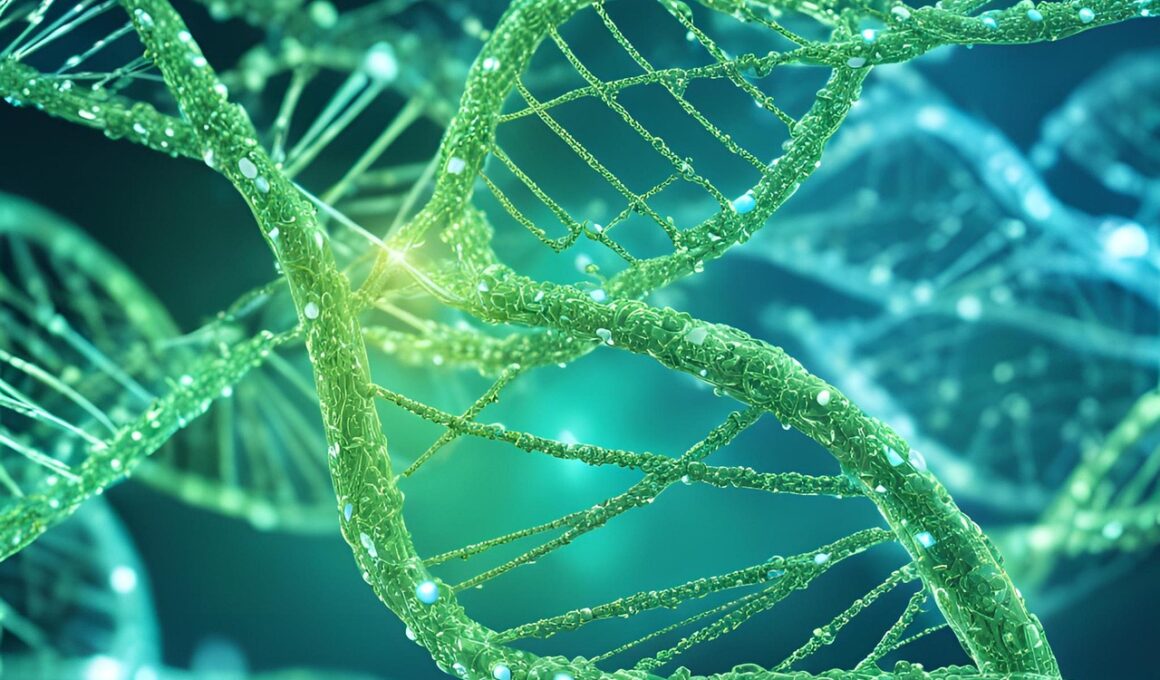The Influence of Genetics on Sports Nutrition Needs
Understanding how genetics impacts sports nutrition needs is essential for athletes aiming to optimize their performance. Genetics can influence various factors, including metabolic rates, nutrient absorption, and recovery rates. Each athlete has a unique genetic makeup, which can determine how effectively they utilize carbohydrates, proteins, and fats during training and competition. For instance, individuals with specific genetic variants may process carbohydrates differently, affecting their energy levels and endurance. Moreover, genetic predispositions can affect how one’s body responds to different diets, meaning some individuals may thrive on high-carbohydrate diets while others perform better on high-protein regimens. This variability underscores the importance of personalized nutrition. Athletes should consider genetic testing as part of their nutritional strategy, as it can provide insights into their dietary needs and help develop tailored meal plans that optimize performance. Furthermore, understanding these genetic influences can help athletes avoid common pitfalls associated with one-size-fits-all dietary recommendations. In conclusion, considering genetic factors is critical for athletes looking to enhance their training through nutrition.
The interplay between genetics and nutrition is particularly evident in athletic performances. Genetic variations can lead to differing efficiencies in energy metabolism, making some athletes more prone to fatigue or injury based on their diet. For example, some have a genetic trait that allows them to metabolize fats more efficiently during exercise. Others may need higher carbohydrate intake for optimal performance due to their genetic composition. Additionally, genetics influence hydration strategies, as some individuals retain fluids differently, impacting electrolyte balance and recovery. Consequently, athletes should tailor hydration and nutrition strategies to align with their genetic predispositions. A thorough understanding of one’s genetic background can allow for more precise adjustments in macronutrient ratios, ensuring that the athlete is not only energized but also able to recover effectively. Nutritional interventions based on genetic insights can significantly improve training outcomes and overall performance. It is essential to recognize that while genetics play a crucial role, they work in tandem with environmental factors, such as diet and training methods, to create optimal performance circumstances.
Tailoring Diet Plans Based on Genetics
Personalized diet plans that take genetic factors into consideration can significantly boost sports performance. Nutritionists equipped with knowledge about an athlete’s genetic profile can design dietary strategies that align with their specific metabolic capabilities. For example, if an athlete has a genetic predisposition toward better muscle recovery with higher protein intake, diet plans should be adjusted accordingly. Similarly, athletes might require support in understanding how their genetic makeup affects nutrient timing and supplementation. Some individuals might perform better with nutrients consumed at specific times, enhancing performance and recovery. Genetics can also encourage different responses to micronutrient intake, influencing the need for vitamins and minerals based on one’s genetic blueprint. Athletes may need to focus more on certain vitamins that their body has difficulty metabolizing. To summarize, recognizing the link between genetics and nutrition enables athletes to create a more effective dietary framework that addresses their individual challenges. Implementing such personalized strategies can pave the way for improvements in performance and overall health.
Moreover, the debate over nature versus nurture has a tangible impact in the context of sports nutrition. While genetics provides a foundation for an athlete’s capabilities, environmental factors play an equally critical role in shaping nutritional needs and overall performance. Training regimens, dietary habits, and recovery strategies can be influenced by cultural, social, and economic factors that often defer from genetic predispositions. For instance, two athletes with similar genetic traits may have different responses to the same diet based on their lifestyle choices. A nutritious diet bolstered by adequate training can outweigh genetic disadvantages to levels of performance. Thus, successful nutrition strategies need to adapt not only to genetic predispositions but also to each athlete’s environment. Utilizing genetic information must always be coupled with holistic considerations, such as workout intensity and recovery timing, to form a comprehensive approach to sports nutrition. Ultimately, understanding how to blend both genetic and contextual varieties allows athletes to strike a balance for peak performance, harnessing both inherent traits and lifestyle adjustments effectively.
Nutrigenomics and Its Relevance
Nutrigenomics has emerged as a pivotal field in sports nutrition, intersecting genetics and diet science to illuminate the relationship between genes and nutrient interactions. This discipline studies how specific dietary components influence gene expression, thereby affecting health and performance outcomes. When it comes to sports nutrition, understanding these interactions is crucial in developing personalized diets for athletes. For instance, consuming certain nutrients may trigger beneficial genetic pathways that enhance muscle recovery and stamina. Nutrigenomics research has revealed that variations within genes can impact individual responses to micronutrients, thus advocating for tailored vitamin intake based on genetic profiling. Athletes who engage in nutrigenomic testing may discover how their genetic makeup interacts with specific foods, leading to tailored dietary plans that optimize their performance. This approach is a proactive step toward more effective nutrition strategies that address athletic goals. As our understanding of nutrigenomics advances, it is essential for athletes to keep abreast of the latest research to further refine their approach to nutrition and athletic training.
Additionally, the role of inflammation in sports performance can also be linked to genetics. Some athletes may possess genetic traits that predispose them to higher levels of inflammation, especially following intense training. This can affect recovery times and overall performance. Tailoring nutrition to manage inflammation can then play a critical role in optimizing athletic capabilities. For example, diets rich in anti-inflammatory foods, such as omega-3 fatty acids and antioxidants, may benefit athletes genetically predisposed to inflammation. Incorporating these foods into daily meals can not only aid in recovery but also enhance overall body function. By addressing inflammation through targeted dietary strategies, athletes can continue to train effectively without being sidelined by prolonged recovery times. Additionally, understanding one’s genetic factors can help in choosing suitable supplements that further mitigate inflammation and boost recovery. This integrative approach to managing nutrition offers athletes a unique advantage in their competitive pursuits, allowing them to maintain better training consistency and performance levels.
Conclusion: The Future of Sports Nutrition
The future of sports nutrition is likely to be shaped significantly by advancements in genetic research. As we continue to learn more about the genetic foundations of nutrition, athletes will have the opportunity to tailor their diets more effectively than ever before. This opens up avenues for personalized nutrition strategies that align with the individual genetic profiles of athletes, ultimately enhancing performance and recovery. Moreover, these insights may lead to innovative supplementation strategies that target specific genetic limitations or requirements for nutrients. A dynamic and responsive nutrition plan tailored to genetic makeup can revolutionize the athletic landscape, ensuring optimal training effectiveness and minimizing injury risk. As scientists and nutritionists work together to bridge the gap between genetics and diet, the implementation of these emerging insights holds the potential to redefine traditional approaches to sports nutrition. Athletes who embrace this tailored methodology can be better equipped to succeed in their athletic endeavors, forging a path aligned with their unique genetic advantages. The integration of genetics into sports nutrition signifies a transformative shift toward more individualized care and understanding.
The Influence of Genetics on Sports Nutrition Needs is not just about the science; it embodies a commitment to optimizing athletic performance through informed decision-making. Athletes and coaches alike must stay informed on the evolving research in genetics and nutrition. Collaboration with nutritionists can further enhance this understanding, allowing teams to develop comprehensive training and dietary regimens that promote peak performance. As we advance into a future that recognizes both genetic and environmental factors in sports nutrition, it is crucial that athletes remain adaptable and informed. With continuous research, athletes can unlock new methodologies to enhance their abilities, training regimens, and dietary practices. Emphasizing education around nutrition that accounts for genetics can transform training dynamics and foster a culture of health and success among athletes. Understanding individual differences will empower athletes to make optimized choices for their nutrition, leading to more strategic performances. Ultimately, the journey of understanding the profound impact of genetics on sports nutrition is just beginning, but its implications for athletes are already vast and promising.





